Graduation Speaker Biographies
Mr Craig Ritchie
10am Thursday 4 April – Faculty of Education and Arts
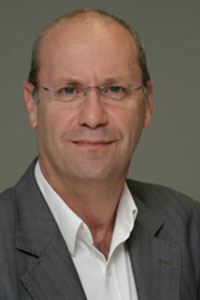
Mr Craig Ritchie comes from the Central West of NSW and is a member of the Macleay Valley's Dhunghutti people. He has spent his professional life campaigning for equity in Indigenous health and education, and informing Indigenous policy at all levels of government.
Mr Ritchie holds a Bachelor of Arts in History, English and Classics from the University of Newcastle and postgraduate qualifications in management from the Australian National University. He is an adjunct Associate Professor in the Faculty of Health Sciences at the University of Sydney and General Manager, Indigenous and Equity Branch - Higher Education Division, in the Commonwealth Department of Industry, Innovation, Science, Research and Tertiary Education.
From 1999 to 2002, Mr Ritchie was the Chief Executive Officer of the National Aboriginal Community Controlled Health Organisation, Australia's peak Aboriginal health body that represents more than 150 Aboriginal community controlled health services across the country. Before this he worked for the Awabakal Newcastle Aboriginal Co-operative in Hamilton.
In late 2002, Mr Ritchie took up the position of founding manager of the Aboriginal and Torres Straits Islander Health Unit within ACT Health, leading the development of the ACT Aboriginal and Torres Strait Islander Health and Family Wellbeing Plan.
In 2006 Mr Ritchie was awarded a Winston Churchill Memorial Trust fellowship to study Indigenous leadership development models in countries with the same experience of colonisation as Australia.
A recognised authority on Indigenous access and equality, Mr Ritchie is currently studying at the University of Sydney, pursuing doctoral studies in the School of Social and Political Sciences. His research looks at the implications of Aboriginal constructions of culture for better policy design and service delivery in Aboriginal and Torres Strait Islander affairs.
Emeritus Professor Phil Foreman AM
2pm Thursday 4 April – Faculty of Education and Arts
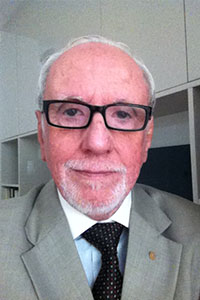
Emeritus Professor Phil Foreman, AM is a distinguished educator and researcher in the field of special education and current Chair of the NSW Institute of Teachers.
Professor Foreman received his Bachelor of Arts degree in education from the University of New England where he went on to study a Master of Education and Master of Letters. He then completed a PhD in Special Education at Macquarie University.
Combining an extensive research and publication record with a significant administrative load for more than 20 years, Professor Foreman was Director of the University of Newcastle's Special Education Centre for 14 years, during which time the Centre developed a significant research profile supported by a number of major grants.
Professor Foreman also served as the University's Dean of Students and later the Dean of Education for six years until his retirement in 2008.
Professor Foreman was instrumental in developing the link between the University of Newcastle and the Royal Institute for Deaf and Blind Children, leading to the establishment of the Renwick Centre, a research centre for projects related to the education of students with hearing or vision impairments. Through the University of Newcastle, the Centre provides postgraduate programs for professionals educating children with sensory disabilities.
In 2013 Professor Foreman was made a Member of the Order of Australia for services to tertiary education, particularly in the area of special education, and to people with a disability.
Professor Foreman is a Life Member of the Australian College of Educators, and of the Royal Institute for Deaf and Blind Children, and a Fellow of the Australian Psychological Society.
Dr Frances Gentle
6pm Thursday 4 April – Faculty of Education and Arts
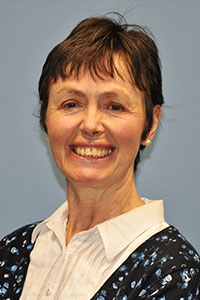
University of Newcastle Alumnus, Dr Frances Gentle, has combined her two passions to work in the education and disability fields for almost 30 years.
Dr Gentle is an academic at the Royal Institute for Deaf and Blind Children's Renwick Centre. Her roles include coordinating and lecturing postgraduate courses in the field of sensory impairment, and researching current issues relating to the education of children with vision impairment.
Dr Gentle holds a Bachelor of Arts and Diploma of Education from Macquarie University, a Bachelor of Special Education from the University of New England, a Masters of Special Education (Sensory Disability) with honours from the University of Newcastle, and a Doctor of Philosophy, also from Newcastle.
Since 1990 Dr Gentle has taught students of all levels in mainstream and special needs schools. She established an English language program at the Tokyo International Learning Centre and Vocational Development Centre for the Blind in Tokyo, and spent 11 years at Sydney's St Edmunds School for Students with Vision Impairment and Other Special Needs.
Regularly featured in the media for her expertise and her work, among Dr Gentle's many accolades is the 2006 Minister's Award for Outstanding Contribution to Literacy and Numeracy in NSW. In early 2012 the University of Newcastle presented Dr Gentle with the Alumni Award for Regional Leadership, in recognition of her educational development work in the Asia-Pacific.
Dr Gentle is the Vice President of the International Council for the Education of People with Visual Impairment and is involved in a range of professional associations including the International Council for the Education of People with Visual Impairment, the Australian Braille Authority, the South Pacific Educators in Vision Impairment body and the Journal of South Pacific Educators in Vision Impairment.
Dr Gentle also holds a conjoint position with the University of Newcastle.
Professor Barry Marshall AC
10am Friday 5 April – Faculty of Health
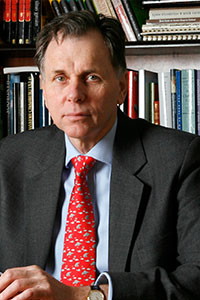
West Australian clinical professor, gastroenterologist and Nobel Laureate, Professor Barry Marshall AC, is a pioneer researcher responsible for the most significant medical discovery in the history of gastroenterology.
In 1982, together with fellow scientist Professor Robin Warren, Professor Marshall hypothesised that the bacterium Helicobacter pylori caused one of the world's most common diseases – peptic ulcer disease. Professor Marshall proved the germ was harmful in a well-publicised 1984 experiment in which he drank a culture of the bacterium and developed gastritis.
The scientists' discovery revolutionised the management of peptic ulcer disease, changing it from a chronic, disabling condition requiring surgery to one curable with a short course of antibiotics.
Professor Marshall was born in Kalgoorlie in 1951 and schooled at Marist Brothers College, Perth from 1960 to 1968. He completed his dual degree Bachelor of Medicine and Bachelor of Surgery at the University of Western Australia in 1974.
In 1984, the World Health Organisation recognised Helicobacter pylori as the main cause of stomach cancer and in 2005, Professors Marshall and Warren won the Nobel Prize for Physiology or Medicine in recognition of their discovery.
Professor Marshall holds several appointments, awards and fellowships. In 1998 he was made a Fellow of the prestigious Royal Society in Britain, and in 2008 was selected as a foreign member of the prestigious United States National Academy of Science, an institution established in 1863 by Abraham Lincoln.
He has been a Fellow of the Australian Academy of Science since 1999 and was made a companion in the General Division of the Order of Australia (AC) in 2007.
Today, Professor Marshall is a Clinical Professor and Co-Director of the Marshall Centre for Infectious Diseases Research and Training, at the University of Western Australia in Perth.
Professor Joseph Sung
2pm Friday 5 April – Faculty of Health
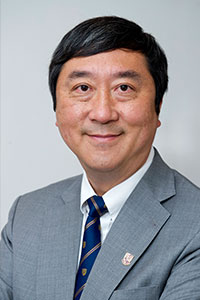
Professor Joseph Sung is a global leader in gastroenterological research whose work has changed the practice of gastroenterology worldwide.
The Vice-Chancellor and President of The Chinese University of Hong Kong (CUHK) received a dual Bachelor of Medicine/Bachelor of Surgery degree from The University of Hong Kong in 1983, a PhD in biomedical sciences from the University of Calgary in 1992 and a Doctor of Medicine from CUHK in 1997.
Professor Sung began his clinical career as a medical officer at CUHK's teaching hospital, the Prince of Wales, in 1985. In 1992 he began lecturing in the university's Department of Medicine and was promoted to Professor of Medicine and Therapeutics in 1998. Professor Sung served as chairman of that department for more than a decade, before taking on roles as Associate Dean (Clinical) of the Faculty of Medicine and Associate Dean (General Affairs).
Professor Sung's research interests include peptic ulcers and colorectal cancers. Together with his team, Professor Sung proved the relationship between the bacterium Helicobacter pylori and peptic ulcer diseases. They demonstrated how to successfully treat peptic ulcers with antibiotics and minimise their relapse, and pioneered the use of endoscopic treatment for ulcer bleeding to reduce the need for surgery.
In 2007 the CUHK appointed Professor Sung Mok Hing Yiu Professor of Medicine, recognising his significant contributions to the prevention and early diagnosis of gastroenterology cancers.
Professor Sung holds fellowships from the Royal Colleges of Physicians of Edinburgh, Thailand, Glasgow, and London; and from the American College of Gastroenterology, the Royal Australian College of Physicians, the American Gastroenterological Association, the Hong Kong College of Physicians and the Hong Kong Academy of Medicine. He has published over 680 full scientific articles in leading journals including The New England Journal of Medicine and the Lancet, edited or authored more than 15 books, and refereed for more than 15 prestigious journals.
Ms Amanda Adrian
6pm Friday 5 April – Faculty of Health
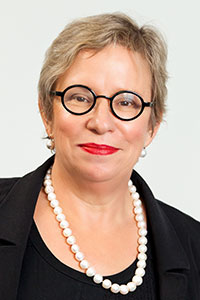
Ms Amanda Adrian has more than 40 years experience in Australia's health industry specialising in safety and quality improvement in health care, nursing, policy development, regulation and ethics.
As Chief Executive Officer of the Australian Nursing and Midwifery Accreditation Council since 2010, Ms Adrian has been instrumental in establishing the national accreditation scheme for nursing and midwifery health professionals in Australia as part of the national registration and accreditation scheme for health professionals that commenced on 1 July 2010.
Ms Adrian obtained her Bachelor of Arts Degree at the University of New England in 1982. Prior to that she had obtained her general nursing certificate at Adelaide Children's Hospital, before specialising in post operating theatre nursing and management at Royal Prince Alfred Hospital in Sydney. Ms Adrian went on to study a Bachelor of Laws degree at the University of New South Wales, from which she graduated in 1992.
In 1993, Ms Adrian was appointed to the New South Wales Department of Health, where she held a number of senior positions over the seven years she was there before being appointed New South Wales Health Care Complaints Commissioner in 2000.
She opened a successful, multi-faceted private practice, Amanda Adrian and Associates, in 2004 before taking up her current position.
A recognised authority in her field, Ms Adrian has researched, lectured, published and presented many papers in consumer participation in health care; governance and management; quality and safety in health care; quality improvement; ethics; and health law.
Ms Adrian was a member of several health, aged and community care services boards including Health Care Australia, the Catholic Care Service Risk Management Committee and the Australian Association of Quality in Health Care, She also chaired the board of the Sisters of St Joseph Aged Care Services (NSW) and is a Fellow of the Australian College of Nursing, a Member of the Australian Institute of Company Directors and the Australian and New Zealand Institute of Health Law and Ethics among other organisations.
Dr Carli Westmore
10am Saturday 6 April - ELFSC
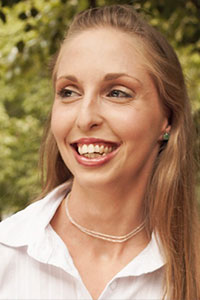
Dr Carli Westmore is a graduate of the University of Newcastle's Open Foundation program, the Bachelor of Oral Health degree and the Bachelor of Medicine degree.
Family circumstance forced Dr Westmore to abandon her home schooling at the age of 15 to financially support and care for her large family. Of Aboriginal descent, she was one of seven siblings and three foster children.
She returned to study at the age of 22, completing her Year 10 school certificate through TAFE in 2000, before leaving her country home for Newcastle and enrolling in the University's six-month, intensive Open Foundation program.
Juggling several casual jobs ranging from cleaning to childcare, Dr Westmore completed Open Foundation in 2004, a Bachelor of Oral Health degree in 2007, and her medical degree in 2012.
The 31-year-old is among the first cohort of students graduating this month from the University's flagship Joint Medical Program.
Dr Westmore hopes to combine the best of dentistry and medicine to become a maxillofacial surgeon. These specialists repair and correct injuries and defects of the head, neck, face, mouth and jaws and require dual dental and medical qualifications.
Her awareness of the critical importance of oral surgery was sparked by her own painful experience where, as a child, she spent 15 years on the waiting list for an operation to reconstruct her upper jaw, which had stopped growing.
In 2008 Dr Westmore received the Outstanding Achievement Award from the Central Coast Pathways Committee for her dedication to achieving her academic goals in the face of significant adversity.
Dr Glenn Platt
2pm Saturday 6 April – Faculty of Engineering and Built Environment
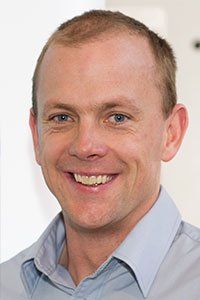
Dr Glenn Platt is the driving force behind the CSIRO's research on energy efficiency and renewable energy integration technologies, directing the work of a diverse team of energy experts delivering world-leading science.
As Theme Leader for Local Energy Systems in the CSIRO's national research group the Energy Transformed Flagship, Dr Platt leads a team charged with improving how energy is delivered to, and used by consumers; and developing cost-effective technologies to cut greenhouse gas emissions in Australia.
Dr Platt completed his qualifications at the University of Newcastle – a Bachelor of Engineering in 2000, a Doctor of Philosophy in Electrical Engineering in 2005, and a Master of Business Administration in 2010. He has also completed the General Management Program at Harvard Business School in the USA.
The Flagship team is developing techniques to integrate additional renewable energy sources into Australia's electricity system and implementing innovative technologies and strategies to modernise the national grid - managing demand peaks and meeting future electricity needs.
Dr Platt has been instrumental in establishing the CSIRO as a key partner in EnergyAustralia's Smart Grid Smart City consortium, a $100 million Australian Government initiative to develop the first commercial scale demonstration of smart grid technology in Australia. CSIRO expertise in advanced control systems and artificial intelligence will be used in the smart grid project, in which the University of Newcastle is also a partner.
An outstanding achiever, Dr Platt has received numerous awards including the Young Achievers Australia Young Hunter Business Person of the Year in 1998 and the 'Best Paper' award at the International Symposium on Energy, Informatics and Cybernetics in 2005. He was named among the best young executives in Australia in the 2011 Financial Review BOSS awards, and received the University's Young Alumni Award in 2012, recognising outstanding achievement by a graduate aged under 35 years.
Professor Mary O'Kane
10am Friday 12 April – Faculty of Science and IT
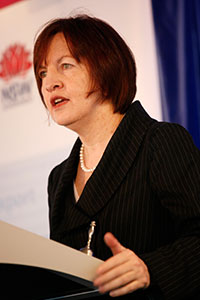
Professor Mary O'Kane is the NSW Chief Scientist and Engineer, a position she has held since 2008. She is also a company director and Executive Chairman of Mary O'Kane & Associates, a company that advises government, universities and the private sector on innovation, research, education and development.
As NSW Chief Scientist and Engineer, Professor O'Kane works with academia, industry and government to ensure scientific knowledge and research is adapted and used to benefit NSW. A key responsibility is to provide the government and community with the best quality advice on policy requiring scientific and engineering input. In her role, she serves on several committees and advisory groups including the Medical Devices Expert Group, the Renewable Energy Taskforce (both of which she Chairs), the Innovation and Productivity Council and the Coal Innovation Council.
She is also a Fellow and former Vice-President of the Academy of Technological Sciences and Engineering and an Honorary Fellow of Engineers, Australia.
Born in central Queensland, Professor O'Kane is a computer engineer and recognised pioneer of research in artificial intelligence, in particular computerised speech recognition. Professor O'Kane completed a Bachelor of Science at the University of Queensland in physics and mathematics and a Doctor of Philosophy at the Australian National University in 1982. She also holds honorary doctorates from Central Queensland University, Macquarie University and the University of Canberra.
Prior to her role as NSW Chief Scientist and Engineer, Professor O'Kane led a successful academic career including as Vice-Chancellor and President of the University of Adelaide from 1996 to 2000, Deputy Vice-Chancellor (Research) at the University of Adelaide from 1994 to 1996, and Dean of the Faculty of Information Sciences and Engineering at the University of Canberra from 1989 to 1993.
Professor O'Kane holds a number of positions, including Chair of the Development Gateway; Chair of the Cooperative Research Centre for Spatial Information; and Director of PSMA Ltd, the Capital Markets Cooperative Research Centre, and Business Events Sydney.
Professor O'Kane was Chair of the Australian Centre for Renewable Energy from 2010 to 2012 and is a former member of the Australian Research Council, the Co-operative Research Centres Committee, the board of FH Faulding & Co Ltd, the board of the CSIRO and the panel for the Australian Government's Review of the National Innovation System
Mr Jeff Julian
2pm Friday 12 April – Faculty of Science & IT
Mr Jeff Julian is a highly regarded designer and art director with a string of Hollywood movies and award-winning advertisements for global clients to his name.
In 1999, Mr Julian completed a Bachelor of Science with honours in Industrial Design at the Art Centre College of Design in Pasadena, California. He went on to work as a designer for high-profile clients including Apple, American Express, Adidas, Audi, Nike, BMW, Gucci, Rolls Royce, Nokia, Oakley and Siemens.
The holder of more than 20 patents for innovations ranging from medical devices, consumer products, transportation and software development, Mr Julian has received six gold awards for Best Art Direction from the world's most recognised international advertising competition - the Clio Awards - and a prestigious Visual Effects Society's award.
Mr Julian's work with Steven Spielberg on the 2002 film The Minority Report propelled him into work with Hollywoods 'A-List' including Ridley Scott, David Fincher, Brian Singer, Warner Brothers Studios, Dreamworks, Digital Domain, Paramount Studios, Universal and Sony.
Mr Julian has worked on Hollywood films across a range of genres. His portfolio includes roles as conceptual designer and visual effects, art director for many films including I Am Legend, X-Men 3, Green Lantern, and Cloud Atlas. He is currently working on the upcoming Brad Pitt remake of the Jules Vern novel, 20,000 Leagues Under the Sea.
Mr Glen Unicomb
10am Saturday 13 April – Faculty of Business and Law
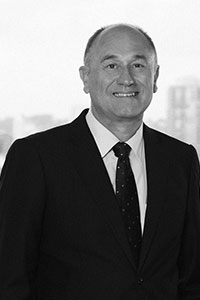
Glen Unicomb is an investigation specialist who has directed some of Australia's highest profile corporate investigations in his 30-year career.
Highly regarded in the Australian regulatory investigation market, Mr Unicomb is a senior advisor in the forensics practice of international advisory firm KordaMentha.
Mr Unicomb studied at the University of Newcastle, completing a Bachelor of Commerce with distinction in 1977. In 1979, he studied a Diploma of Education at the University of Sydney before completing a Graduate Diploma in Financial Planning at the Securities Institute of Australia, and a Graduate Certificate in Management at the University of Queensland in 2001.
Mr Unicomb has led large and complex litigation, investigation and fraud assignments for lawyers, corporations and government. During a 20-year career with the Australian Securities and Investments Commission - Australia's corporate, markets and financial services regulator – Mr Unicomb investigated breaches of the Corporations Act and the Crimes Act, failure of risk management frameworks, corrupt payments and bribes, fraud and misconduct, governance breaches and suspicious transactions.
He managed the investigation into the largest superannuation fraud in Australia's history, involving losses in excess of $180 million at Trio Capital Limited.
Mr Unicomb has steered several other high profile investigations in Australia including the $5.6 billion collapse of the HIH Group of companies; the landmark James Hardie asbestos compensation case that redefined the responsibilities of executives and directors of public companies; and the $200 million collapse of the Fincorp Group of companies, a failed funds management and property development scheme.
Justice Stephen Gageler
2pm Saturday 13 April – Faculty of Business and Law
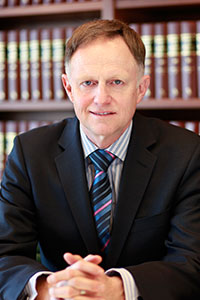
Justice Stephen Gageler is a Justice of the High Court of Australia. Born and raised in the Upper Hunter village of Sandy Hollow, he has risen through the judicial ranks to become one of Australia's eminent barristers, a highly respected member of the New South Wales Bar, and a legal adviser at the highest levels.
Previously the Solicitor-General of Australia - the Commonwealth's second-ranking law officer - Justice Gagler is the 49th appointment to the High Court since it was established in 1903.
He earned a Bachelor of Economics in 1980 from the Australian National University and went on to graduate with a Bachelor of Laws in 1982 before completing his Master of Laws at Harvard University in 1987.
Early in his career, Justice Gageler was an Associate to Sir Anthony Mason, a former Justice and Chief Justice of the High Court. It is Sir Mason's seat that Justice Gageler now holds and is the position originally held by Australia's first prime minister, Sir Edmund Barton.
Upon his return from Harvard Law School, Justice Gageler worked for 20 years as a barrister specialising in constitutional, administrative, revenue and commercial law.
In 2008 he was appointed Solicitor-General of Australia, advising the Government and appearing as counsel in significant cases including the 'Malaysia solution' and the cigarette plain packaging laws.
Justice Gageler's appointment as a Justice of the High Court of Australia was announced in August 2012 and he commenced his role in October the same year.
Away from the courtroom, Justice Gageler revels in being a family man, father-of-three, practicing Christian and a Taekwondo black belt.
The University of Newcastle acknowledges the traditional custodians of the lands within our footprint areas: Awabakal, Darkinjung, Biripai, Worimi, Wonnarua, and Eora Nations. We also pay respect to the wisdom of our Elders past and present.